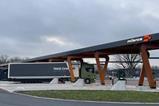In Germany, the Chair of Production Engineering of E-Mobility Components (PEM) at RWTH Aachen University has reported successful test results for its prototype electric truck featuring a hydrogen fuel cell range extender.

The prototype, a product of the “SeLv” research project focusing on heavy-duty trucks for emission-free logistics, underwent various tests covering approximately 500 kilometres at the Aldenhoven Testing Center in North Rhine-Westphalia.
The project, funded by the German Federal Ministry for Digital and Transport with around €16.9 million, is titled “Heavy-duty trucks for zero-emission logistics in heavy-duty transport using electrification modules and an economical production system” (SeLv). The initiative, scheduled to run until the end of 2024, aims to develop an electric powertrain with a Fuel Cell “range extender” for commercial vehicles with a gross vehicle weight of 41 tonnes. The modular powertrain is designed to be suitable for both retrofit solutions and new vehicles.
The successful test drives mark a significant milestone for the project. In October 2022, the RWTH Chair initially presented a battery-electric prototype, with plans to incorporate the fuel cell range extender in subsequent phases. The Hydrogen system, as well as the energy and thermal management, underwent thorough testing during the recent trials.
According to PEM Director Professor Achim Kampker, “The tests under real conditions have shown that the combination of battery-electric drivetrain and fuel cell-hydrogen system works for heavy-duty trucks. After checking the basic functions, we successfully tested the hydrogen system as well as the energy and thermal management.”
The project’s next steps toward industrialisation involve collaboration with RWTH University’s spin-off, Moion GmbH, which will play a crucial role in providing truck conversions and the necessary powertrain kit in the future. As of now, no further updates on the project’s status have been disclosed.


















